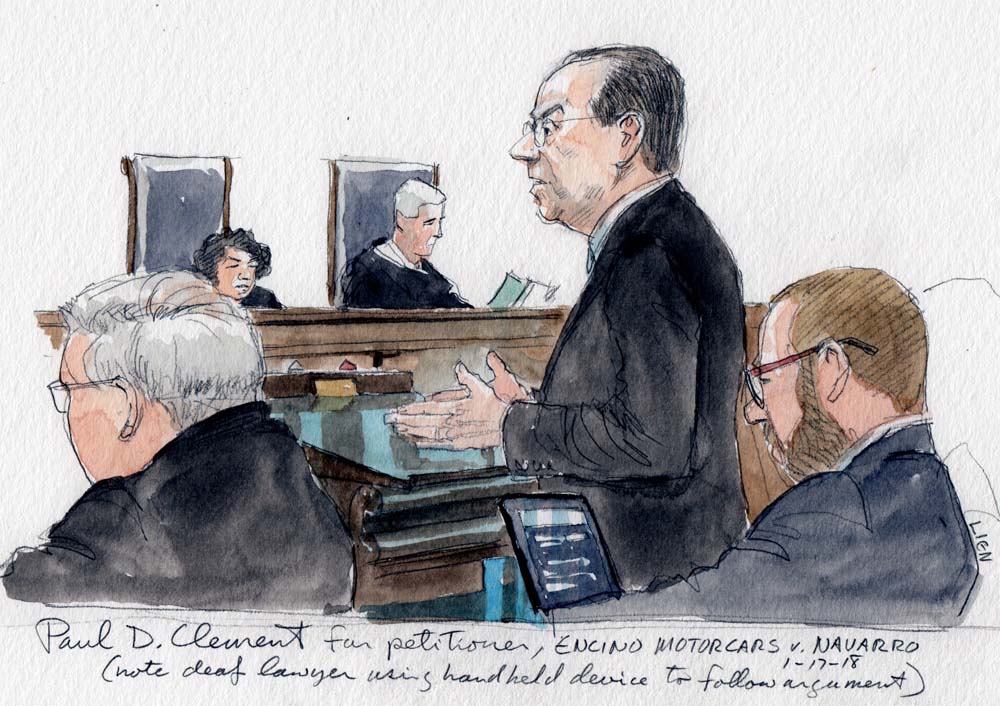A “view” from the courtroom: Any coffee or doughnuts here?

on Jan 17, 2018 at 4:59 pm

There are some 40,000 job classifications in the United States (a figure used by Justice Stephen Breyer today). Under the Fair Labor Standards Act of 1938, many are eligible for overtime pay. Many others are expressly exempt, either under the statute or under Department of Labor regulations.
Of all those jobs, only one has come under scrutiny in the Supreme Court twice in the last three terms over whether it is exempt from overtime pay — service advisor in an automobile dealership. In Encino Motorcars LLC v. Navarro, the justices will once again attempt to answer whether the employee who greets you in the dealership service department is eligible for overtime.
Of course, many of the jobs of the new economy would mystify Americans of 1938 — computer systems analyst, database security administrator, desktop publisher, ride-hailing driver and virtual assistant. These are all from the Labor Department’s Occupational Outlook Handbook, which still lists thousands of old-economy jobs and tends to toss a lot of newer ones into broader, traditional categories.
Before we get to the Encino Motorcars argument, there is a special job classification being used in the courtroom today — sign-language interpreter for the deaf. For at least the second time in two years, the court is swearing in several members of the Deaf and Hard of Hearing Bar Association, and it has permitted two sign-language interpreters to sign the court’s two arguments this morning. In addition, as it did when I wrote about a previous visit of the bar group in 2016, the court is allowing Communication Access Realtime Translation, or CART. Several of the bar-group members have brought their smartphones or tablets into the bar section to follow the arguments on screen. (It’s a special secure wi-fi system active only for occasions such as this.)

Paul D. Clement for petitioner (note, deaf lawyer in foreground using handheld device to follow argument) (Art Lien)
Once new bar members have been sworn in, Paul Clement steps to the lectern for Encino Motorcars, as he did in 2016.
In the first go-around, the court held that a 2011 interpretation of the overtime-pay provision of the FSLA had been issued without “reasoned explanation” and that a lower court had to construe the case without placing weight on the department’s interpretation.
As I wrote here when the opinion came down in June 2016, the first iteration of the case was “a bit of an eye-opener” about how the friendly service advisor is “often a commissioned salesperson charged with trying to upsell you on certain parts and services.”
Today, Clement says, “Service advisors are plainly salespeople, and what they sell and what they are primarily engaged in is the servicing of automobiles.”
Thus, the nation’s 100,000 service advisors are covered under a 1966 amendment to the FSLA that made any salesman, partsman or mechanic exempt from overtime pay, he argues.
In response to a question from Justice Ruth Bader Ginsburg, Clement points out that although there are other jobs at the typical dealership that are not exempt, there is at least one other example of a job considered a separate category but still treated as part of one of the exempt categories.
“The example would be automobile body repairmen,” Clement says, which the Labor Department has always treated as exempt “just like mechanics in the repair shop.’
Justice Elena Kagan engages Clement at some length, challenging him on the repairman comparison.
“It does seem as though, for all the arguments that you do have, that one cuts against you, that, you know, just the ordinary meaning of what it means to be engaged in servicing automobiles is to be repairing, maintaining, fixing cars,” Kagan says, suggesting that service advisors don’t do that.
“I’d love to talk to you about some of the other arguments you seem to like better, but let me try to push back a little bit on this one,” Clement says, noting that service can have a broader meaning of providing the service. His argument is bolstered, he says, by Congress’ inclusion of “partsman” in the statute, because partsmen requisition, order and stock parts but don’t get under the hood and “turn the wrenches” on vehicles.
Kagan presses a hypothetical involving seamstresses, and after some back and forth, Clement tries to suggest that Kagan had designed a lot of hypotheticals “and you probably gave me one of the best ones.”
“Now you’re daring me,” Kagan says, to laughter in the courtroom.
James Feldman of the Supreme Court Clinic at the University of Pennsylvania Law School steps to the lectern on behalf of a group of service advisors at Encino Motorcars, a Mercedes-Benz dealership. Stephanos Bibas, who argued on behalf of the advisors in 2016, is now on the U.S. Court of Appeals for the 3rd Circuit.
Feldman’s brief says the advisors are required to work from 7:00 a.m. to 6:00 p.m. at least five days a week, for a weekly minimum of 55 hours.
“The clearest reason why service advisors don’t come within that exemption is they don’t service automobiles,” Feldman says. “You don’t maintain or repair a car, in the way people would ordinarily speak, with a pad or a clipboard and a pencil or a telephone, which are the primary tools that service advisors use.”
Chief Justice John Roberts, suggesting that he’s spent his share of time at the service department, challenges Feldman.
“They do look under the hood sometimes, right?” Roberts says. “You bring the car up, you know, ‘it’s making this noise,’ they go out and at least listen to the noise, and sometimes they can say right away: ‘Oh, that’s probably this.’”
“I don’t think so,” Feldman responds. “They may make a guess as to what’s wrong and … say, well, it might be the distributor cap. But it’s up to the mechanic to actually figure out what’s wrong, not the service advisor.”
Justice Anthony Kennedy asks Feldman about a service advisor who meets a customer in the morning and says, “I’m a service advisor. I’m here to supervise and to plan the servicing of your automobile. Is that correct for him to say?”
Feldman says no. The advisors don’t supervise the mechanics, but serve a “communications function.” No one today openly discusses the advisors’ potential profit-increasing function.
Kennedy suggests that if an advisor is arranging for service, “it seems to me he’s engaged in servicing the automobile.”
Roberts suggests that the service advisor is important to long-term customer relationships.
“It’s sort of common understanding if you, over several years, dropped your car off whenever you’re supposed to or whenever it’s broken, and you talk to Fred about getting it fixed, and — and somebody comes to you later and says something — I’ve got a problem with my car — you would say, ‘my service guy is Fred, go see him.’”
Kagan has a question about a voice that is missing from today’s argument.
“Mr. Feldman, the solicitor general is not here in a case in which one would expect the government to be here. Do you know whether there’s any activity taking place in the Department of Labor with respect to this issue?”
Feldman says he doesn’t. In his rebuttal time, Clement responds by pointing to Footnote 9 of his reply brief, which says that the department’s Wage and Hour Division issued a bulletin in early January announcing it would suspend any enforcement actions against dealerships pending the outcome of this case.
(In a sentence that only the executive branch could write, the bulletin says, “Until further notice, WHD will not assert that service advisors who are employed by a nonmanufacturing establishment primarily engaged in the business of selling automobiles, trucks, or farm implements to ultimate purchasers do not meet the overtime pay exemption under [the statute].”)
The argument will continue with discussion of the many dealership jobs that are covered by overtime — financing salespeople, lube technicians, car jockeys, dispatchers, secretaries.
This case will likely be in the shop for at least two or three months. If you need to check on the progress, just call the court’s service department and ask for Fred.


